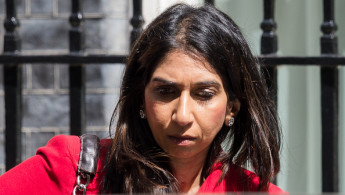Iranian Revolutionary Guards Corps pose 'biggest threat' to UK national security: Braverman
The UK' Home Secretary Suella Braverman believes that the Iranian Revolutionary Guards Corps (IRGC) is the biggest threat to the Britain's national security, according to a report by The Sunday Times.
Braverman, who has gained notoriety for her anti-immigration stance, fears that the group is stepping up its activities.
She has expressed concern about intelligence reports claiming that Iranian spies are attempting to recruit members of organised crime gangs to target Iranian dissidents living in the UK.
“The Iranian threat is the one that worries [the UK] the most,” a source close to the home secretary told The Sunday Times. “It’s a big issue because they are getting much more aggressive and their appetite is increasing … They are very defensive to anyone challenging their regime”, the source added.
According to reports by the UK’s domestic counterintelligence and security agency MI5, the Iranian government was behind ten murder and kidnap plots in the UK since January alone. The Metropolitan Police said in February that it had risen to fifteen.
The IRGC is the main custodian of Iran’s Islamic revolution and plays a major role in the country’s foreign policy, including Iran's intervention in Syria on behalf of Bashar al-Assad. It also controls vast segments of the Iranian economy.
The organisation has played a key role in crushing protests that arose in Iran after the death in custody of 22-year-old Mahsa Amini, who was arrested by the "morality police" for not properly wearing a hijab.
'Campaigns of transnational oppression'
Earlier this year, the UK's Foreign Secretary James Cleverly announced sanctions on the IRGC, but there is pressure for the UK government to go beyond this and officially proscribe the group as a terrorist organisation.
Alice Kearns MP, chair of the foreign affairs select committee, made the case that the IRGC ought to be proscribed due not just to its threat to the UK, but due to its “campaigns of transnational oppression” across the world, particularly in Syria and Iraq.
The IRGC is a proscribed terrorist organisation in the US, the UK's most important ally on intelligence and other foreign policy matters.
Despite this, the British Home Office has rejected officially designating the IRGC as a terrorist organisation, for fear it would make it harder to revive talks on the failed Iranian nuclear deal.





 Follow the Middle East's top stories in English at The New Arab on Google News
Follow the Middle East's top stories in English at The New Arab on Google News


